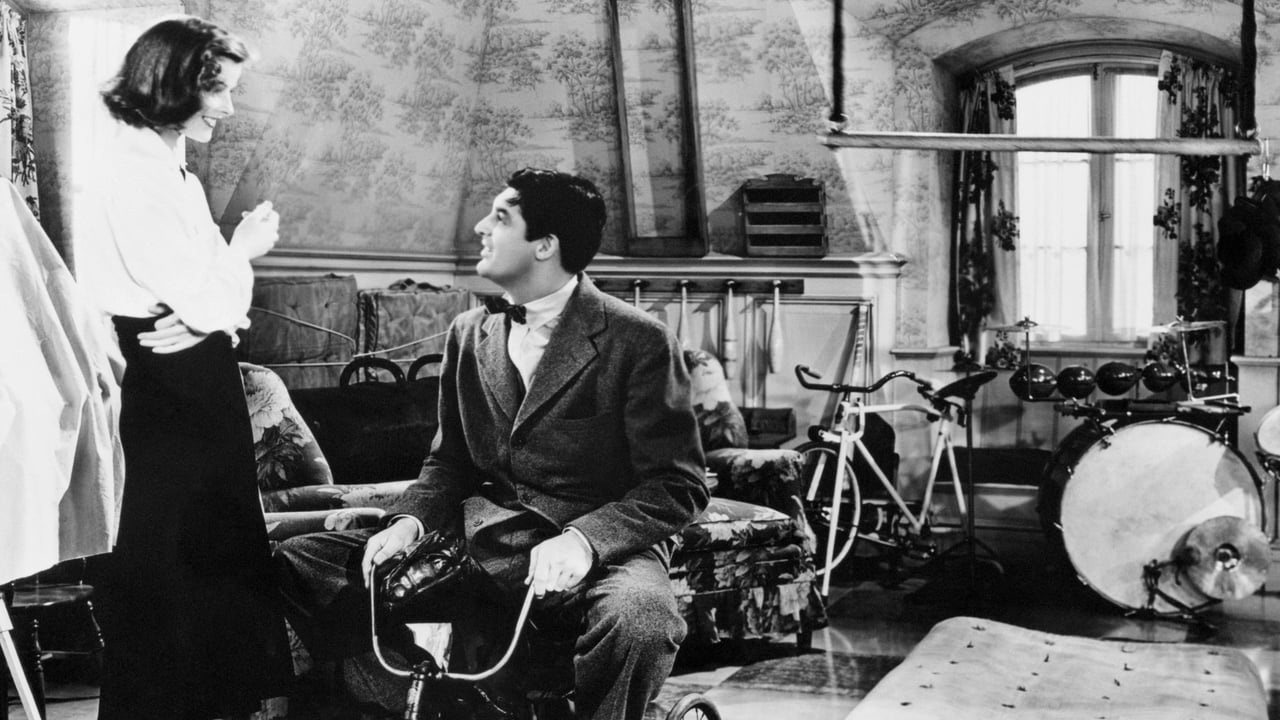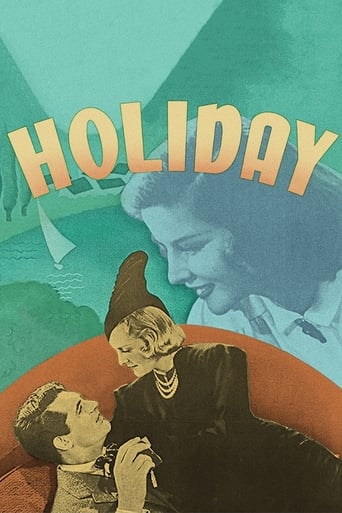

A brilliant film that helped define a genre
... View MoreIt's a mild crowd pleaser for people who are exhausted by blockbusters.
... View Moreif their story seems completely bonkers, almost like a feverish work of fiction, you ain't heard nothing yet.
... View MoreIt’s sentimental, ridiculously long and only occasionally funny
... View MoreJohnny Case (Cary Grant) is on cloud nine as he tells his friends the Potters that he's marrying Julia Seton (Doris Nolan). Only he doesn't know that she's the daughter in a wealthy family. She wants him incorporated into her money-making family. Her older black sheep sister Linda (Katharine Hepburn) loves his carefree attitude. Her loving mother passed away and her father is a hard man. Her brother Ned was a musician but her father puts him to work in a life that he hates.Cary Grant and Katharine Hepburn have superior charisma and terrific chemistry together. That's all the film needs and all that any viewer needs to know. The characters are fast-talking fun with some slapstick thrown in. They learn to follow their dreams and their hearts rather than follow their family obligations. Grant is always a great every man and it's important that he's not a slacker. He is the new self-made man not encumbered by money while Hepburn is the liberated woman.
... View MoreDuring the 1930s, Hollywood cranked out far more comedies and romances than any other genres. It was the time of the Great Depression, and the U.S. and the world needed their spirits lifted. Hollywood did its part to help raise hopes with its films to make people laugh and smile. Looking back on that time now, it may seem strange that so many of the films were about the wealthy or people living a high lifestyle. But being well off and having fun were things that people often aspired to, and thus, something to keep their hopes up. So, the plots of many films were about such people living a wealthy lifestyle. Some other films, though, treated the rich from another standpoint. The wealthy were portrayed as snobbish and unhappy in the midst of all their riches. Enter Columbia's "Holiday" in June, 1938. It is a witty, clever, funny film about life – enjoying life. There can be no doubt about the clash of the haves and have-nots in this hilarious and not subtly biting derision of money and riches for their own sake. Cary Grant, as Johnny Case, has had to work since the age of 10. Doris Nolan, as Julia Seton, imagines the thrill of business conquests. The countenance of her father, played by Henry Kolker, belies any sense of enjoyment or happiness for all his wealth. Lew Ayres as the son, Ned, and Katherine Hepburn as eldest daughter, Linda, epitomize family members whose spirits have been squelched by their wealth and social position. The only flaw in the plot is the notion that Grant's Johnny Case and Nolan's Julia Seton could fall for each other in the first place. They are at opposite ends on everything in the film. Was it mere infatuation by both, with nothing spoken or discussed between them. Of course, that's absurd. So, we're left with this strange and inexplicable situation. But, to the rescue come Edward Everett Horton and Jean Dixon as Case's close friends Professor Nick Potter and Susan Potter. The witty dialog between them and with Johnny adds life and spice to the film. The later encounters with Linda and Ned further add to the humor so we soon forget the damnable question. It still bites a bit, but we move on from wondering how Johnny and Julia ever got together and were engaged in the first place.Amidst this comedy of errors, the satire becomes more apparent as the plot unfolds. We see more and more how the enslavement of wealth suppresses individual spirits and robs people of true happiness. The screenplay, direction and acting all lend to an excellent film. One extra bonus to me is that we get to see some of Cary Grant's acrobatic skills. I can't recall any other film in which we see Grant doing flips, cartwheels and tumbles. It all adds up to an entertaining film. It is a great comedy – with a message.
... View MoreAudiences in 1938 stayed away from this generally witty adaptation of Philip Barry's play about a 30-year-old 'self-made man' who plans to retire and be free from responsibilities (perhaps it was the hardships of the Depression that, by contrast, made the picture seem out-of-touch?). Cary Grant (with a thick head of black Brylcreem'd hair) performs amiably in the underwritten lead, discovering his fiancée is the daughter of a wealthy banker, a man who'd prefer his future son-in-law to go into business with him. Katharine Hepburn plays Grant's prospective sister-in-law, who finds herself drawn to his carefree nature despite all her resistance. Opens on a light, frivolous note, but becomes more substantial and interesting in its final third. George Cukor directed, allowing the characters room to blossom and change, although some of his asides (such as Hepburn's emotional visit to professor Edward Everett Horton's apartment, or the curiously dissatisfied nature of her embittered brother) stick out as odd concepts which don't quite come off. **1/2 from ****
... View MoreThis film was boring... super boring... super predictable. A successful idealistic young man meets his wealthy fiancé's family for the first time -- and they're rich... and shallow... and try to make him ~make money... and be more successful... and are shallow... and judgmental... and talk about people behind their back. He just wants to spend a few months or years travelling the world aimlessly. He meets his match in a jaded young woman played by Katherine Hepburn. All the lines are clichés, which basically have the meaning 'being rich or successful doesn't matter, what matters is being happy!' and 'rich people are shallow.' This movie feels dated and Linda's angst comes across as just spoiled; I find it very hard to relate to her. She's also extremely actressy and overdone in this film, giving long and dramatic monologues about her situation (as a rich beautiful young woman who's the black sheep of her family and refuses to settle down.) I really don't get the problem, there seems to be no plot, and while Cary Grant is as charming and insightful as ever he doesn't seem to quite mesh with the incredibly unlikable Hepburn. I did like the dissolute brother, who played a part with humor. And of course the lovely scenery and costumes of the period, almost over the top.
... View More